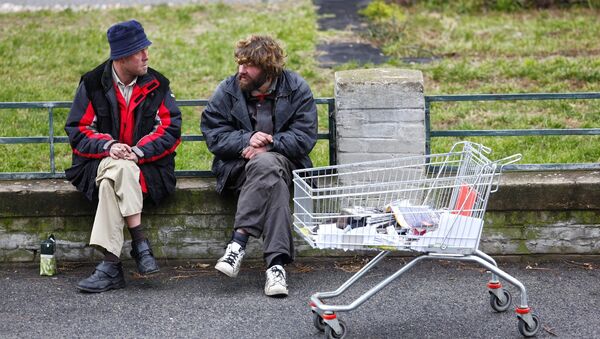Sputnik discussed this with Vavra Suk, editor-in-chief of the Swedish newspaper Nya Tider.
Sputnik: Can you tell us about the situation surrounding this begging ban, is there really that serious of a problem in Sweden?
Now there's also another problem related to this and it's where the beggars live, where they stay. So in a week or two, they can completely destroy a park or a forest, because they're building homes out of [all the] garbage they can find and they use children's playgrounds as toilets. That is really terrible and it's annoying people.
READ MORE: 'Beyond Belief': Swedish Capital City Turns a Blind Eye to Daesh Returnees
Sputnik: Can you explain where are these beggars are coming from and why they have fallen through the cracks of your welfare system?
Vavra Suk: Well, first of all, they're coming from mainly Eastern European countries, like Romania, Bulgaria and so on, and many of them are gipsies that are in a poor state in their countries and they're really not entitled to the Swedish welfare system. Although the European Union has opened for migration and freedom of movement, it's not supposed to be for people begging, it is supposed to be for people working, right? So there is no system to take care of this.
Sputnik: So this is a problem with the freedom of movement that's allowed by the European Union?
Suddenly they have beggars on their own doorstep; it is a very difficult question for people and there are actually tools today to handle this. The European Union, the freedom of movement, allows to stay for three months and if this was enforced, then the problem with the beggars in Sweden would be much smaller; but the police are afraid to act on these laws because they're afraid of being called "racist" because most of these people are gipsies.
The politicians don't have the will to enforce this kind of measures, which are already are in place. So this whole discussion about "bans" and "not bans", it really feels like a political theatre, where no one really wants to take care of the problem.
READ MORE: Sweden's 'Man-Free' Feminist Festival Ruled Discriminatory
Sputnik: If there is no welfare system that they're entitled to, what is the draw?
Vavra Suk: Swedish people are very kind, so a lot of people actually give money to the beggars, and that's the motivation. If people stopped giving them money, they wouldn't be here, so it's that simple.
And, as you say, the weather today is terrible, it's snowing, raining and it must be really hard to, for example, live somewhere in the park. But many people are also tricked or fooled to come to Sweden because evidently this begging is organized. There have been some court cases, but mostly the beggars don't speak, only if they are really beaten up or there were some cases where they were nearly killed and left in the snow because they didn't want to be a part of this begging scheme anymore.
Sputnik: Why is the government unable to fight the traffickers?
Of, course, they don't want to beg on the streets, but they say that we should go after the traffickers, the organizers, but it's also very hard for the police to act because of the stigma; they're afraid of being called "racist" if they start questioning people who beg or who are gipsies. So this is a politically very sensitive question.
Views and opinions, expressed in the article are those of Vavra Suk and do not necessarily reflect those of Sputnik




